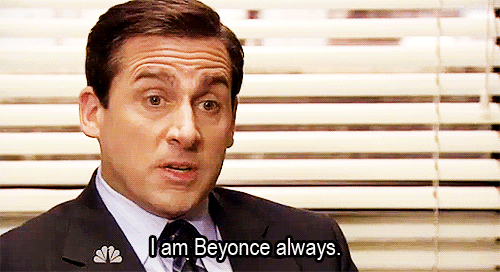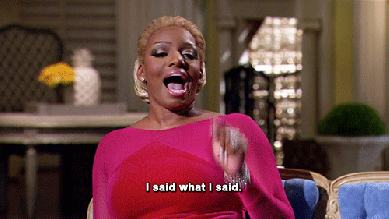Alternatively Titled: On Beyoncé, the Grammys and feeling second best in the Church

“Lemonade” was the album of the year regardless of who went home with the award last night. The devastation and anger many felt at the result is all too common. Beyoncé was invited to sit front row for the show, her “iconic performance” was teased before every commercial break until she performed (the Recording Academy’s own words), but she wasn’t recognized in one non-genre category (the biggest awards of the night). In fact, Beyoncé has been nominated for 62 Grammys and has only won one non-genre award.
I get it “Lemonade” wasn’t as accessible as “25.” It was a visually stunning work on the beauty and the burden of being a black woman, a wife, a mother. It was complicated and didn’t fit neatly or quietly into a box.
But, this isn’t just about Beyoncé, it’s about all the ways black people, specifically black women are consistently told they aren’t good enough, for black women it’s the “you are pretty for a black girl.” It is heartbreaking all the ways America will profit off our bodies, applaud our culture, enjoy our gifts, but not embrace us.
Even in the church, where we profess unity as the body of Christ, women of color are often marginalized. We are picked last. We are told we are too loud, too domineering, too stubborn, because we aren’t understood. And rather than make the effort at understanding, we are told our gifts aren’t good enough, we’re not submissive enough, we’re not soft enough, we’re not quiet enough, we haven’t waited enough…. we aren’t enough.
But here’s the thing, we are worthy regardless of what culture says or how the flawed people of the church make us feel sometimes. We are worthy because we are created in the image of God. We are worthy because we are daughters of the King.
Recognition doesn’t change our identity. In the same way that Eddie Murphy’s character in “Coming to America” was a prince even while he lived in a dump in Queens and worked in a fast food restaurant. He was always a Prince regardless of whether his co-workers at McDowell’s recognized him as one. Whether he lived in the projects or a palace, his lineage remained the same, being born to the King, made him an heir. Just as we are made co-heirs with Christ when we are born-again through our confession of Christ as our Savior.
We are enough, not by our own efforts or the recognition of our leaders. We are enough because of who Christ is and what He has done.
Beyoncé is still Beyoncé. And we are still co-heirs with Christ, regardless of whether the leaders or the powerful sees us. God does. This is not to in any way suggest the tendency to ignore or marginalize women of color is okay. This is about how we choose to receive or not receive the actions or in some cases the inactions of others.
I am choosing not to receive it, because it’s a lie. God does value us. I am a daughter of the King. God does see me. Just as He saw Hagar when she was forced to flee Sarah’s abuse. When the Angel of the Lord appeared to her in the desert, it says in Genesis 16:13, So she named the Lord who spoke to her, “You are El-Roi”; for she said, “Have I really seen God and remained alive after seeing him?” (NRSV)
What I love about this verse is that Hagar got to give God a new name, El-Roi. This is the first and last time this name for God is used in Scripture and it was given to him by a slave girl. Someone with little power, who was usually unseen and overlooked, who had been abused by her employers got to create a new name for God!
El-Roi is personal. She experienced God in a way Sarah didn’t. Sarah also had personal experiences with God. But their experiences with Him were different, because they were different. Sarah was an Israelite and Abraham’s wife. Hagar was an Egyptian slave and forced into position she did not choose. She was shocked when the angel of the Lord appeared to her, because she was so used to being ignored. But God not only saw her, He made her a promise and told her to name her son, Ishmael, which means God heard your misery. God sees and hears even when the world doesn’t.
Being a black woman in America and in the American church often means going unseen, like Hagar. This invisibility is why “Lemonade” was such a seminal work for black women. Beyoncé spoke directly to our hearts, acknowledged the blessing and the burden of being a black woman, and said “our story matters and is worthy of sharing.” It’s also why it was important for Adele to acknowledge what Beyoncé means specifically for black people. It’s also why the rejection of the Recording Academy stings in the same way it stings when white evangelicals fail to acknowledge or fully esteem black women.
We cannot find our worth in others. Psalms 146:3 says don’t put your trust in princes, in mortal men, who cannot save… but blessed is [she] whose help is in the God of Jacob, who’s hope is in the Lord [her] God.
We are daughters of the King and because of who His is we are worthy. We are enough. We are seen. He will wipe every tear from our eyes. He has an inheritance for us, an encounter in a desert place, and a unique utterance from our lips. Nothing is wasted in God’s economy. The very thing our enemy means to harm us, to hold us back, God will use for our good. (Genesis 50:20).
Despite the myth of the strong black woman, it is sometimes exhausting to be a black woman in America with the constant messaging of the majority culture about our worth. It’s hard to maintain any sort of affection towards those who demean us, ignore our accomplishments, yet benefit from our contributions. It’s hard in my flesh. Yet, it is my identity as a daughter of the King that allows me to consistently take the lemons of the world and make lemonade.
- What parts of Hagar’s story do you identify with?
- How have you allowed the world to tell you a lie about your identity?
- How do verses like Ephesians 2:10, Psalms 139:13-14, Romans 8:16-17 speak to your identity?
- How are you using your voice or power to affirm and push out front the women of color in your life?
